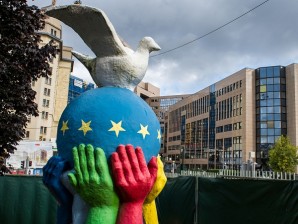
A statue of a globe painted with the EU flag and a peace dove stands in the garden of a church near the EU Council in Brussels, Friday, October 12, 2012. The European Union won the Nobel Peace Prize on Friday for its efforts to promote peace and democracy in Europe, despite being in the midst of its biggest crisis since the bloc was created in the 1950s. AP/Geert Vanden Wijngaert
OSLO, Norway—The European Union (EU) won the Nobel Peace Prize on Friday for its efforts to promote peace and democracy in Europe despite being in the midst of its biggest crisis since the bloc was created in the 1950s.
The Norwegian prize committee said the EU received the award for six decades of contributions “to the advancement of peace and reconciliation, democracy and human rights in Europe.”
“The stabilizing part played by the European Union has helped to transform a once torn Europe from a continent of war to a continent of peace,” Nobel committee Chair Thorbjoern Jagland said in announcing the award.
“This is a message to Europe to do everything they can to secure what they’ve achieved and move forward,” Jagland said, saying it was a reminder of what would be lost “if the union is allowed to collapse.”
He praised the EU for rebuilding after World War II and for its role in spreading stability after the 1989 fall of the Berlin Wall.
The EU rose from the ashes of World War II, born of the conviction that ever-closer economic ties would make sure that century-old enemies never turned on each other again. It’s now made up of 500-million people in 27 nations, with other nations lined up, waiting to join.
The idea of a united Europe began to take on a more defined shape when, on May 9, 1950, French Foreign Minister Robert Schuman proposed that France and the Federal Republic of Germany pool their coal and steel resources in a new organization that other European countries could join.
Close partners
“Today, war between Germany and France is unthinkable. This shows how, through well-aimed efforts and by building up mutual confidence, historical enemies can become close partners,” the committee said.
The citation also noted the democratic conditions the EU has demanded of all those nations waiting to join, referred to Greece and Spain when they joined in 1980, and to the countries in Eastern Europe who sought EU membership after the 1989 fall of the Berlin Wall.
The prize focused on the EU’s historical role as a builder of peace at a time when the union’s existence is under challenge from the financial crisis that has stirred deep tensions between north and south, and when there are questions about the form in which the EU will survive.
“The EU is currently undergoing grave economic difficulties and considerable social unrest,” Jagland said. “The Norwegian Nobel Committee wishes to focus on what it sees as the EU’s most important result: the successful struggle for peace and reconciliation and for democracy and human rights.
“The stabilizing part played by the EU has helped to transform most of Europe from a continent of war to a continent of peace.”
The EU won from a field of 231 candidates including Russian dissidents and religious leaders working for Muslim-Christian reconciliation.
Surprise
But the EU is mired in crisis with strains on the euro, the common currency shared by 17 nations. The prize was a surprise given the EU’s current woes.
Many Norwegians are bitterly opposed to the EU, seeing it as a threat to the sovereignty of nation states. “I find this absurd,” the leader of Norway’s anti-EU membership organization, Heming Olaussen, told the Norweigian Broadcasting Corp.
“In Latin America and other parts of the world, they will view this quite differently than they will from Brussels. The union is a trade bloc that contributes to keeping many countries in poverty.”
Norway, the home of the peace prize, has voted “no” twice to joining the EU in 1972 and 1994. The country has prospered outside the EU, partly thanks to huge oil and gas resources.
The five-member committee is appointed by parliament, where parties are deeply split over EU membership. Jagland has long favored EU membership.
Janne Haaland Matlary, professor of international politics at Oslo University, who has twice nominated the EU for the prize, praised the award.
Unanimous choice
“The European Union has been the most effective creator of peace in the world since its inception with the coal and steel union in the 1950s,” she told Reuters. “Today, it is unthinkable with military conflict between members in the EU.”
The prize, worth $1.2 million, will be presented in Oslo on Dec. 10. The decision by the five-member panel, led by Jagland, who is also Secretary-General of the Council of Europe, was unanimous.
It was not yet clear who would accept the prize for the EU. With a report from Reuters